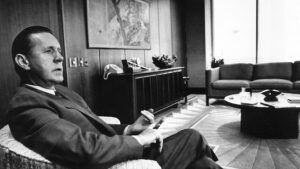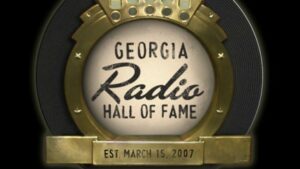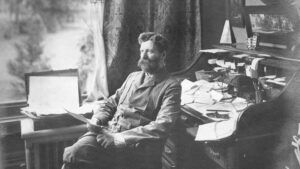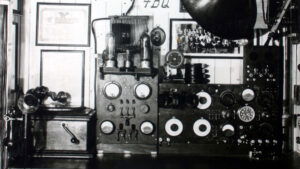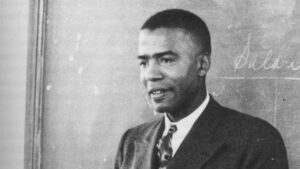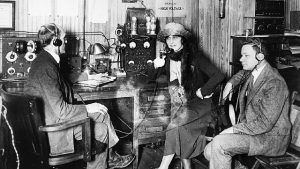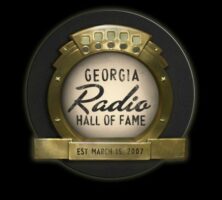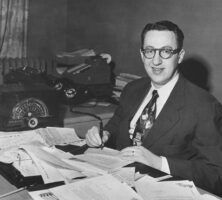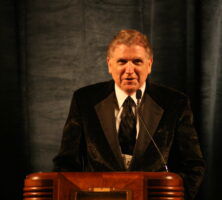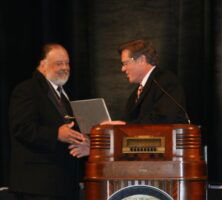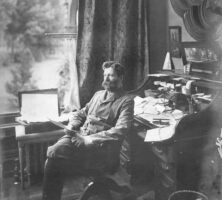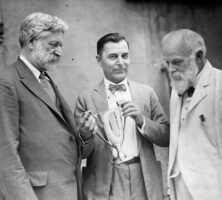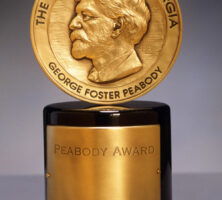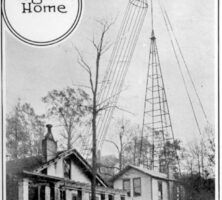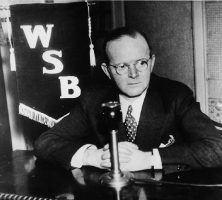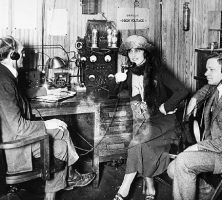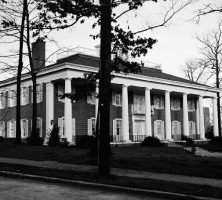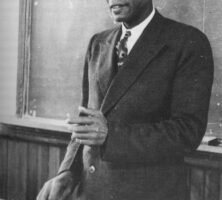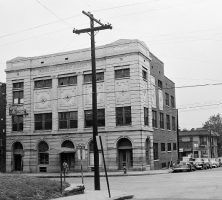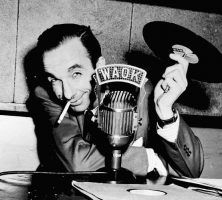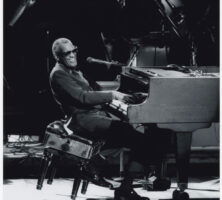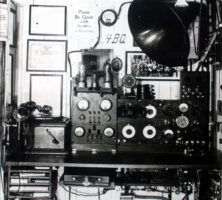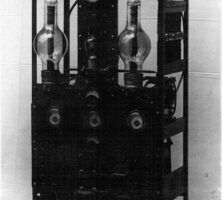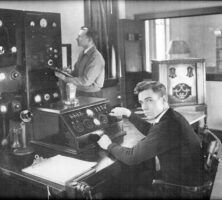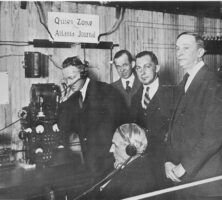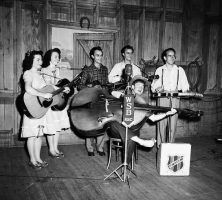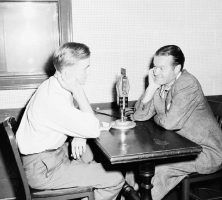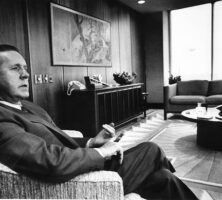The New Georgia Encyclopedia is supported by funding from A More Perfect Union, a special initiative of the National Endowment for the Humanities.
The Georgia Radio Hall of Fame was founded in 2007 to honor the work of Georgia's radio professionals and to preserve the history of Georgia radio.
Courtesy of the Georgia Radio Hall of Fame
The New Georgia Encyclopedia does not hold the copyright for this media resource and can neither grant nor deny permission to republish or reproduce the image online or in print. All requests for permission to publish or reproduce the resource must be submitted to the rights holder.
Elmo Ellis's 1950s campaign, "Removing the Rust from Radio," encouraged the revitalization of radio in the wake of television's growing popularity. Ellis was honored with a Peabody Award and was inducted into the Georgia Association of Broadcasters Hall of Fame.
Courtesy of History of WSB Radio
The New Georgia Encyclopedia does not hold the copyright for this media resource and can neither grant nor deny permission to republish or reproduce the image online or in print. All requests for permission to publish or reproduce the resource must be submitted to the rights holder.
Sam Hale, cofounder of the Georgia Radio Hall of Fame, welcomes guests to the organization's inaugural induction awards ceremony, held in Atlanta in 2007.
Courtesy of the Georgia Radio Hall of Fame
The New Georgia Encyclopedia does not hold the copyright for this media resource and can neither grant nor deny permission to republish or reproduce the image online or in print. All requests for permission to publish or reproduce the resource must be submitted to the rights holder.
John Long (left), cofounder of the Georgia Radio Hall of Fame, accepts a commendation from Georgia governor Sonny Perdue (not pictured) at the organization's inaugural induction awards ceremony, held in Atlanta in 2007.
Courtesy of Georgia Radio Hall of Fame
The New Georgia Encyclopedia does not hold the copyright for this media resource and can neither grant nor deny permission to republish or reproduce the image online or in print. All requests for permission to publish or reproduce the resource must be submitted to the rights holder.
The headquarters for Georgia Public Broadcasting (GPB), which comprises GPB Television, GPB Radio, and the Education and Technology Services Division, are located in Atlanta. As of 2006 the network operated nine television stations and sixteen radio stations across the state.
Courtesy of Atlanta Journal-Constitution.
The New Georgia Encyclopedia does not hold the copyright for this media resource and can neither grant nor deny permission to republish or reproduce the image online or in print. All requests for permission to publish or reproduce the resource must be submitted to the Atlanta Journal-Constitution.
Masani (left), the host of The Jazz Spot, a series on GPB Radio, conducts an interview. The studios for GPB Radio, one component of the Georgia Public Broadcasting network, are located in Atlanta.
Courtesy of Georgia Public Broadcasting.
The New Georgia Encyclopedia does not hold the copyright for this media resource and can neither grant nor deny permission to republish or reproduce the image online or in print. Requests for permission to publish or reproduce the resource should be submitted to Georgia Public Broadcasting.
The financier and philanthropist George Foster Peabody, a native of Columbus, made significant contributions to the University of Georgia beginning in the late 1800s. In 1906 he was named a life trustee of and awarded an honorary degree by the university.
Courtesy of Hargrett Rare Book and Manuscript Library, University of Georgia Libraries, John Brown Gordon Family Papers.
The New Georgia Encyclopedia does not hold the copyright for this media resource and can neither grant nor deny permission to republish or reproduce the image online or in print. Requests for permission to publish or reproduce the resource should be submitted to the Hargrett Manuscript and Rare Book Library at the University of Georgia.
George Foster Peabody (left) and University of Georgia chancellor David C. Barrow (right) honor Harry Hodgson, a businessman and trustee of the University of Georgia, for his leadership of an endowment campaign for the school, circa 1920.
The New Georgia Encyclopedia does not hold the copyright for this media resource and can neither grant nor deny permission to republish or reproduce the image online or in print. Requests for permission to publish or reproduce the resource should be submitted to the Hargrett Manuscript and Rare Book Library at the University of Georgia.
The George Foster Peabody Award is given annually by the Grady College of Journalism and Mass Communication at the University of Georgia to honor "distinguished achievement and meritorious service" by individuals, networks, stations, and organizations in the media industry.
Courtesy of University of Georgia Photographic Services
The New Georgia Encyclopedia does not hold the copyright for this media resource and can neither grant nor deny permission to republish or reproduce the image online or in print. All requests for permission to publish or reproduce the resource must be submitted to the rights holder.
Gordon Hight's 100-watt transmitter was used by WSB to transmit the first commercial radio broadcast in Georgia on March 15, 1922.
Courtesy of Michael H. McDougald
The New Georgia Encyclopedia does not hold the copyright for this media resource and can neither grant nor deny permission to republish or reproduce the image online or in print. All requests for permission to publish or reproduce the resource must be submitted to the rights holder.
Lambdin Kay was the WSB station manager from 1922 to 1940. During station breaks Kay would play a three-note chime, which was adopted by the National Broadcasting Company (NBC) in 1927, when WSB became an affiliate of that network. The chime is still used by NBC today.
The New Georgia Encyclopedia does not hold the copyright for this media resource and can neither grant nor deny permission to republish or reproduce the image online or in print. Requests for permission to publish or reproduce the resource should be submitted to Special Collections and Archives at Georgia State University.
Efrem Zimbalist Sr. (far right) sits in the WSB studio with his wife, singer Alma Gluck, and engineer Walter Tison in the 1920s. Zimbalist's first radio performance was broadcast by WSB.
Courtesy of Special Collections & Archives, Georgia State University Library, Lane Brothers Commercial Photographers Photographic Collection.
The New Georgia Encyclopedia does not hold the copyright for this media resource and can neither grant nor deny permission to republish or reproduce the image online or in print. Requests for permission to publish or reproduce the resource should be submitted to Special Collections and Archives at Georgia State University.
The WSB station moved from the Biltmore Hotel in 1956 to "White Columns" on Peachtree Street. Today White Columns also houses WSB-TV and other Cox Radio properties.
Courtesy of Special Collections & Archives, Georgia State University Library, Lane Brothers Commercial Photographers Photographic Collection.
The New Georgia Encyclopedia does not hold the copyright for this media resource and can neither grant nor deny permission to republish or reproduce the image online or in print. Requests for permission to publish or reproduce the resource should be submitted to Special Collections and Archives at Georgia State University.
Jesse B. Blayton Sr., known as the "Dean of Negro Accountants," speaks in 1928. Blayton worked as both a bank president and a college professor before purchasing WERD in 1949. In 1995 he was inducted into the Radio Hall of Fame.
The New Georgia Encyclopedia does not hold the copyright for this media resource and can neither grant nor deny permission to republish or reproduce the image online or in print. All requests for permission to publish or reproduce the resource must be submitted to the Atlanta University Center Robert W. Woodruff Library and Archives Research Center.
During the 1960s, the WERD radio station shared the Prince Hall Masonic Lodge on Auburn Avenue with the Southern Christian Leadership Conference.
Courtesy of Special Collections & Archives, Georgia State University Library, Lane Brothers Commercial Photographers Photographic Collection.
The New Georgia Encyclopedia does not hold the copyright for this media resource and can neither grant nor deny permission to republish or reproduce the image online or in print. Requests for permission to publish or reproduce the resource should be submitted to Special Collections and Archives at Georgia State University.
In 1956 disc jockey and social activist Zenas Sears established the Atlanta radio station WAOK, one of the first in the country to play blues, rhythm and blues, and soul music as the primary format.
Courtesy of Special Collections & Archives, Georgia State University Library, Lane Brothers Commercial Photographers Photographic Collection.
The New Georgia Encyclopedia does not hold the copyright for this media resource and can neither grant nor deny permission to republish or reproduce the image online or in print. Requests for permission to publish or reproduce the resource should be submitted to Special Collections and Archives at Georgia State University.
Ray Charles, a performer and recording artist, pioneered a new style of music in the 1950s and 1960s called "soul," a blend of gospel, blues, and jazz.
The New Georgia Encyclopedia does not hold the copyright for this media resource and can neither grant nor deny permission to republish or reproduce the image online or in print. Requests for permission to publish or reproduce the resource should be submitted to the Hargrett Manuscript and Rare Book Library at the University of Georgia.
This amateur radio gear is typical of the 1925-30 era and is more sophisticated in the transmittal of sound than the earliest equipment built around 1900.
Courtesy of Michael H. McDougald
The New Georgia Encyclopedia does not hold the copyright for this media resource and can neither grant nor deny permission to republish or reproduce the image online or in print. All requests for permission to publish or reproduce the resource must be submitted to the rights holder.
These heavy-duty "power" tubes, built around 1929, transmitted radio signals. Stations often used a combination of ice and fans to keep the tubes cool.
Courtesy of Michael H. McDougald
The New Georgia Encyclopedia does not hold the copyright for this media resource and can neither grant nor deny permission to republish or reproduce the image online or in print. All requests for permission to publish or reproduce the resource must be submitted to the rights holder.
Located in heavily draped studios above a furniture store on Broad Street in Rome, the radio transmission room at WRGA (formerly WFDV) provided a "soundproofed" studio. The younger man is believed to be Jimmy Kirby, who became a popular announcer.
Courtesy of Michael H. McDougald
The New Georgia Encyclopedia does not hold the copyright for this media resource and can neither grant nor deny permission to republish or reproduce the image online or in print. All requests for permission to publish or reproduce the resource must be submitted to the rights holder.
Industrialist Henry Ford (seated) visits the WSB studio in Atlanta, circa 1922. Ford was the guest of Major John Cohen (right), the editor of the Atlanta Journal who is credited with spearheading the effort to transmit the first commercial radio signal in the South.
Courtesy of Michael H. McDougald
The New Georgia Encyclopedia does not hold the copyright for this media resource and can neither grant nor deny permission to republish or reproduce the image online or in print. All requests for permission to publish or reproduce the resource must be submitted to the rights holder.
A musical group performs in 1955 for the popular WSB Barn Dance program.
Courtesy of Special Collections & Archives, Georgia State University Library, Lane Brothers Commercial Photographers Photographic Collection.
The New Georgia Encyclopedia does not hold the copyright for this media resource and can neither grant nor deny permission to republish or reproduce the image online or in print. Requests for permission to publish or reproduce the resource should be submitted to Special Collections and Archives at Georgia State University.
Bob Hope, who broadcast his own radio program for U.S. troops from military bases during World War II (1941-45), is interviewed in 1946 for the Atlanta radio station WSB.
Courtesy of Special Collections & Archives, Georgia State University Library, Lane Brothers Commercial Photographers Photographic Collection.
The New Georgia Encyclopedia does not hold the copyright for this media resource and can neither grant nor deny permission to republish or reproduce the image online or in print. Requests for permission to publish or reproduce the resource should be submitted to Special Collections and Archives at Georgia State University.
After achieving great success as a businessman and politician, Fuqua has demonstrated significant generosity as a philanthropist.
Courtesy of Atlanta Journal-Constitution.
The New Georgia Encyclopedia does not hold the copyright for this media resource and can neither grant nor deny permission to republish or reproduce the image online or in print. All requests for permission to publish or reproduce the resource must be submitted to the Atlanta Journal-Constitution.
The Fuqua Orchid Center at the Atlanta Botanical Garden, next to Piedmont Park, is named for the philanthropist J. B. Fuqua.
Image from Brett Weinstein
The New Georgia Encyclopedia does not hold the copyright for this media resource and can neither grant nor deny permission to republish or reproduce the image online or in print. All requests for permission to publish or reproduce the resource must be submitted to the rights holder.
